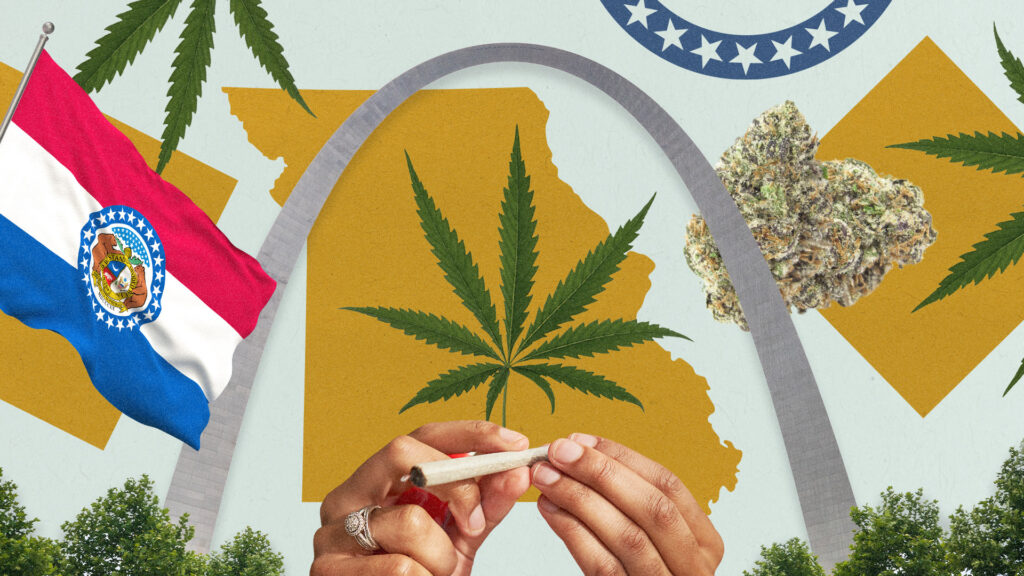Tens of millions of cannabis consumers will enjoy broadening civil rights and access to weed, thanks to a collection of new laws and regulations taking effect this week and beyond in at least 11 US states.
Voters, regulators, and lawmakers across the US enacted laws, rules, and executive orders that take effect this week from sea to shining sea. Here’s the state-by-state rundown of weed laws taking effect in 2023.
California

The world’s largest legal weed market, California, keeps leading the way with several new laws kicking in this year:
Cannabis taxes might go up a bit for consumers. The state changed the way it collects excise tax—moving it from the distributor to the retailer. The tax computation is complicated and involves multiple layers of taxes, but it boils down to higher consumer costs.
At the same time, medium and large growing licenses became legal in California on January 1, promising to further drive cannabis supplies up and prices down. (Read our 2022 Leafly Cannabis Harvest Report for more details.)
Patients received new rights to use medical cannabis with opioids. AB 1954 protects a patient’s right to medical treatment even if they use marijuana, as well as the right of physicians and clinics to treat them. Consumer advocacy group California NORML championed the law, which states, “A physician and surgeon shall not automatically deny treatment or medication to a qualified patient based solely on a positive drug screen for THC or report of medical cannabis use without first completing a case-by-case evaluation of the patient that includes, but is not limited to, a determination that the qualified patient’s use of medical cannabis is medically significant to the treatment or medication.”
Parents also received new rights to responsibly use cannabis. AB2595 requires social workers to treat parental use of cannabis the same as alcohol or prescription medication. Legalization Proposition 64 protected medical cannabis patients with children, and AB2595 expands those rights to adult-use consumers.
Terminally ill patients also gained the right to self-administer cannabinoids in hospice settings. SB 988 requires healthcare facilities to “develop and disseminate written guidelines for the use and disposal of medicinal cannabis within the health care facility pursuant to this chapter.” (Patients in other states—like Kansas—continue to face arrest for using cannabis while dying.)
And expungements will ramp up now that AB1706 forces county courts to expedite the clearance of cannabis records.
California cannabis rules changes

California lawmakers also made it easier to do canna-business in the regulation-heavy state:
- Bars can host cannabis events under AB 2210.
- Cannabis businesses will find it easier to get insurance under AB 2568, which clarifies that insurers aren’t breaking the law by serving the weed industry.
- And dogs and cats on cannabidiol for anxiety got more rights thanks to AB 1885, which allows vets to recommend cannabinoids without fear of discipline.
New York

New York will become the country’s second biggest legal cannabis market, now that dispensary sales started at the end of December. More stores should come online in the coming weeks and months.
Oregon
One of the first two states in the US to legalize cannabis, Oregon, further streamlined its industry with new laws taking effect Jan. 1.
- Oregon retailers can now offer discounts like half off a particular brand or strain. But they can’t do ‘buy one get one free’ deals.
- Oregon cannabis deliveries can cross county lines.
- Walk-up options at Oregon dispensaries are fully legal.
- Drive-thru Oregon dispensaries will remain tolerated.
Colorado
Psychedelic mushroom decriminalization took effect in Colorado on Jan. 4. Production and sales still carry criminal penalties, though. Meanwhile, medical marijuana transfers to the adult-use system also got easier under state law.
Connecticut
A 2021 law that legalized adult-use cannabis takes effect in Connecticut. The state also began automatically expunging convictions for possession of less than 4 ounces from 2000 to 2015. Adult-use sales begin Jan. 10. Home growing remains banned.
Missouri

The second former confederate state in the US—Missouri—legalized cannabis in 2022, and possession rights kicked in late last year. Missouri stores will open this year.
Maryland
Maryland weed users need nor fear criminal prosecution—decriminalization of possession of up to 1.5 ounces (about a 45-day supply if you smoke a gram a day) kicked in on Jan. 1. Full legalization starts later this year.
Illinois
Pandemic-era policy allowing curbside pickup at dispensaries expired on Jan. 1 in Illinois. The state began sales in 2020 and has 177 dispensary licenses.
Kentucky
Medical cannabis patients in Kentucky who get busted in the state with up to 8 ounces of out-of-state weed can get a “full, complete, and conditional pardon.” Kentucky governor Andy Beshear signed an executive order protecting patients last year. The order took effect on Jan. 1.
Oklahoma
Beyond the start of the year, much more lies in store for the cannabis liberation movement. Oklahoma holds a special election in March on adult-use legalization.
Vermont
And the tiny northeast state of Vermont may lift its THC cap on cannabis flower buds and hash. Under current rules, cannabis flower may not test higher than 30% THC, and extracts may not exceed 60% THC. Two states in the US—Vermont and Connecticut—have such caps. About 25 adult-use dispensaries have opened in Vermont.
Did we miss an important cannabis law or regulation? Comment below and we’ll add them in.
Read the full article here









